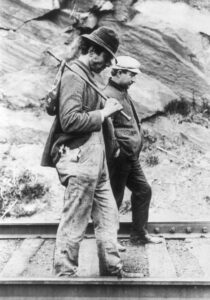 No, our word this week is not academic. It may, however, turn up in a number of courses in the Humanities or Social Sciences.
No, our word this week is not academic. It may, however, turn up in a number of courses in the Humanities or Social Sciences.
When I asked a class last week, no one knew, though one student ventured that it meant a homeless person. In my afternoon class, one student described a person who travels illegally by train to seek temporary jobs. Another gave the stereotype I knew as a child: vagabonds (itself a wonderful word) carrying all their belongings tied in in a rag on the end of a stick.
As historians of the Great Depression could tell us, some Hobos might have been homeless or might have taken to the road by choice. But my concern here is the word, rather than the way of life. Much remains mysterious. We don’t really have a clear etymology for the term, as both the Wikipedia and OED entries demonstrate.
I do know this: my Depression-Era mom warned me and my friend about playing near the railroad tracks because there was a “hobo jungle” there and they might carry us off. To me, in the late 1960s, Hobos were colorful male wanderers with a can of beans over a campfire, dirty and tattered clothing that was once luxurious, and belongings in that famous “bindle” on a stick. In fact, a forgotten synonym for hobo is “bindlestiff,” as the Wikipedia entry notes.
You can learn a great deal about hobos at the Wikipedia page, including a small glossary of hobo slang and a few facts about female hobos. The romanticized idea of the Hobo as a noble wanderer rejecting American standards for success and consumption has been appropriated by the Beat writers, who often traveled with hobos Postwar, and more recently by a very hip magazine.
Finally, give yourself a Hobo name. Mine is “Professor Honest Walker.”
May the yard bulls never knock you around, may you always hop a cannonball and may your Mulligan Stew be delicious. Enjoy your summers. This blog will not go on vacation, so send me words and metaphors worthy of consideration.
See all of our Metaphors of the Month here and Words of the Week here.
Image of walking hobos courtesy of Wikipedia. Hobo Jungle courtesy of project XRoads, University of Virginia.

On our monthly troop camping trips, Scouts put together and cook “hobo packs” over the fire, and the kids always ask what a hobo is. So the word lives on in Scouting.
I think that “bindlestiff” is used in Steinbeck’s Of Mice and Men, although I could be wrong.
John Hodgman’s book The Areas of My Expertise (a collection of made-up facts written in the style of one of those old books of curious trivia) has a list of hundreds of hobo names.